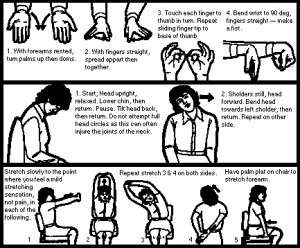The human body and brain are resilient enough to endure a certain level of stress. However, when stress builds up and doesn’t let up, it can overwhelm your coping mechanisms and lead to a host of issues, making it difficult to manage stress. These will generally affect your health, both physically and mentally, and it’s a good idea to understand more about this to help you reduce the chances of it happening in the future.
8 ways stress can affect your health
1. Problems With Your Digestive System
The liver increases glucose (blood sugar) production under stress to provide an energy boost. This additional glucose spike could overwhelm the body if you’re under persistent stress, and it could even eventually lead to type 2 diabetes.
An unsettled stomach is another side effect of the hormonal surge, accelerated respiration, and accelerated heart rate associated with stress. If your stomach acid levels are high, you may have heartburn or acid reflux more often. Stress can also raise your risk of developing an ulcer or make an existing ulcer worse.
Diarrhea and constipation are only two of the digestive issues that stress can cause. You could also feel sick to your stomach, throw up, or have a stomach ache. All of this is down to stress in many cases.
2. You Can Crave Bad Foods
When you’re under a lot of stress, you’re more likely to choose unhealthy foods and reach for them instead of healthy ones. This is because cravings can be caused by not having enough dopamine or serotonin in the brain – the result of stress.
When you’re stressed, your adrenal glands make cortisol, also known as the “stress hormone,” and your brain has a low level of serotonin. This makes you want comfort foods, like those that are high in simple carbs. After you eat them, insulin levels rise, which tells the brain to release serotonin from its stores, making you feel good. But this rush of serotonin doesn’t last long. Soon after, you’ll usually feel tired or hungry again, and the same cycle of bad feelings will keep going.
3. Problems With Your Immune System
Stress makes the immune system work harder, which can be a good thing in the short term. This stimulation can keep you from getting sick and help your wounds heal. But over time, stress hormones will make your immune system weaker and make it harder for your body to fight off invaders from the outside.
People who have a lot of stress are more likely to get the flu, the common cold, and other infections that are caused by viruses. Stress can also make it take longer for you to get better after getting sick or hurt.
4. Your Nails Could Be Damaged
When you are stressed, you are more likely to bite your nails, and high cortisol levels can actually stop your nails from growing. This probably happens because you aren’t getting enough nutrients because of the stress.
When your nails finally grow out again, you may notice lines called Beau’s lines running across them. The good news is Beau’s lines will simply grow out as time goes on – but only if you are able to reduce your stress levels.
5. Issues With Reproduction
Physical and mental fatigue are common results of stress, and when under persistent stress, it’s common to lose your libido. It’s true that men may experience temporary increases in the production of the male hormone testosterone in response to stress, but this effect wears off quickly.
A man’s testosterone levels can begin to diminish if stress persists for an extended period of time. If the body is unable to produce enough sperm, the result might be impotence or erectile dysfunction.
An irregular menstrual cycle is one of the many ways in which stress can manifest physically in women. Periods may become uncomfortable, heavier, or irregular as a result. Chronic stress can also make the physical symptoms of menopause worse.

6. It Can Affect Your Sleep
Stress and sleep are connected in a lot of different ways. Stress and trouble sleeping are both bad, but they make each other worse.
If you can’t sleep, you’ll feel more stressed, and when you’re more stressed, you’ll have less chance of getting to sleep – your brain can’t stop going over and over the things that are stressing you out.
As you can see, this could go on and on, and the only thing you can do is reduce your stress levels (and see a specialist if it’s a chronic problem). Although it’s easier said than done when it comes to lowering the amount of stress in your life, it is worth thinking about.
Consider what is causing your stress and how you might get past it. A bad relationship might need a discussion, and perhaps it needs to end. A poor financial situation might be made better by budgeting and cutting back or even finding a new job.
Even small frustrations like a slow computer system can cause stress – if that’s the issue, click over here for some help. Essentially, find out what the problem is and deal with it, and you can reduce your stress levels substantially.
7. Increased Risk Of Stroke Or Heart Attack
When people are under a lot of stress, they can sometimes have heart attacks or strokes. Stress makes a part of your brain called the hypothalamus work harder, which in turn makes your adrenal glands release cortisol and adrenaline.
This could make your heart beat faster and raise your blood pressure. When you’re always stressed, your blood pressure goes up, which makes your heart have to work harder to pump and move blood around your body. When your blood pressure goes up and down, you are more likely to have a heart attack or stroke.
8. It Might Lead to Depression
There are many ways to stave off depression in life. You might exercise, you might have a hobby, you might spend time with friends. All of these things are good. When you are chronically stressed, however, you can easily stop doing these things – you just don’t feel up to it.
The problem is that this leaves the door open for depression. It’s another cycle, as we mentioned above; when stress means you can’t do the things you usually do, you could develop depression, and that will lead to more stress.

What can you do to manage stress?
Managing stress right now will make you feel better while protecting your health in the long term. Research shows that improving your psychological health can benefit your heart health. Do things that bring you joy and happiness. Make time for activities you enjoy every day.
Here are 5 effective strategies to manage stress
1. Identify what is causing your stress
Monitor yourself. How do you feel? If something is stressing you, make a note of what it is and your thoughts about it. When you know what is bothering you, think about how to address it so that you can find ways to manage stress.
Perhaps you need to adjust your expectations for yourself and others. Maybe you need to reach out for help with your to-do list. Make a list of your commitments and priorities and consider removing non-essential tasks.
2. Focus on your relationships
Relationships can cause stress. While negative reactions with your partner can cause changes in stress-sensitive hormones, relationships can also serve as stress buffers. Your family and close friends can help you through a tough time with support and a fresh perspective to tackle your stressors.

3. Manage your anger
When you are angry, just walk away rather than react. Count to 10. Then review. Walk it off. Or take up a physical activity to blow off steam. Exercise generates endorphins, your body’s natural mood boosters. Pledge to go for a daily walk or swim or jog to manage stress.
4. Give your mind a rest
The best way to manage stress is to ensure that you get 7-8 hours of sleep regularly. To do this, limit caffeine, remove distractions and electronics from your bedroom and try and go to bed at the same time each night. Yoga and other relaxation exercises can help you reduce and manage stress while also improving your immune system.
Read: Yoga for stress relief
5. Get professional help
If you are unable to manage stress on your own, reach out to a psychologist or licensed mental health professional who will help you identify situations/behaviors that trigger your stress and make an action plan to change these.
Stay healthy!





